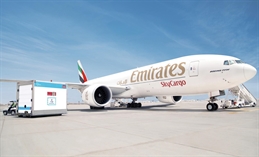
Emirates SkyCargo continues to transport vaccines and related medical supplies with no letdown as the world recovers from the Covid-19 pandemic.
The Dubai-based cargo airline recently marked a milestone for moving 1 billion doses of coronavirus vaccine on more than 2,000 Emirates flights, and it expects demand for transport of temperature-sensitive pharmaceutical cargo to continue even beyond the pandemic.
Julian Sutch, head of global sales, pharma, at Emirates SkyCargo, said the carrier intends to keep delivering vaccinations where they are requested and needed the most – while noting that aside from Covid shots, there’s also a similar demand, if not more, for transport of other pharmaceutical items worldwide.
“Emirates SkyCargo continues to deliver Covid-19 vaccines at the same rate and pace and has not seen any let-up in that demand,” Sutch told Asia Cargo News.
“However, the Covid-19 vaccine is only one of the many other pharmaceuticals we transport, including medication for cancer, diabetes, cardiovascular diseases, and many more.”
The airline executive said Emirates SkyCargo transported 4,200 tonnes of the Covid-19 vaccine since 2021 but the carrier flies on average 300 tonnes of pharmaceutical cargo every day.
“It is mainly critical life-saving medicines and treatments on our aircraft that go to more than 140 destinations across six continents every day,” Sutch added.
“Our most popular routes for pharma are still the U.S., Europe, India, and Africa, creating that vital link to transport critical and life-saving medication,” he said further.
Emirates said it was also able to transform Dubai into a pharma hub for its operations, making it top of mind for those moving temperature-sensitive medications between Asia and Europe.
“The response from the market was overwhelmingly positive and we managed to very quickly transform the perception that Dubai was a destination to be avoided for pharma cargo in the summer to that of Dubai being a reliable hub for pharma customers all year round,” Sutch told Asia Cargo News.
While Emirates SkyCargo has introduced a “360-degree transportation solution” backed by its GDP-certified Dubai handling facility for pharma since 2016, the cargo airline has expanded its pharma cool chain infrastructure with a temperature-controlled environment (2-25 degrees Celsius) for the storage and handling of vaccines and other pharmaceuticals at its purpose-built GDP certified facility in June 2021.
Sutch said the new extension can hold an estimated 60-90 million doses of Covid-19 vaccines at one time.
Emirates also continues to make investments in pharma transport.
Currently, the airline has more than 35 stations in its pharma network across the world, but, the Emirates executive said, with its partners, the cargo carrier has also been working to introduce specialized equipment for enhanced temperature protection on the ramp.
The cargo airline also has one of the world’s largest fleets of Cool Dollys, which help maintain cargo at a stable temperature between aircraft and terminal – 50 of them dedicated to pharmaceutical cargo alone.
“Emirates SkyCargo is constantly looking at ways to make the process more efficient and cost-effective. As a leader in the industry, we need to keep moving with an ever-changing landscape,” Sutch said.
“It has been very important for Emirates SkyCargo to build on its capabilities to handle temperature-sensitive cargo even if we had the infrastructure and facilities in place since 2016. We are constantly updating it,” he added.
Moving forward, Emirates SkyCargo expects the transport of pharmaceutical cargo to remain stable beyond the pandemic with a boost from worldwide demand for much-needed medication.
“The transportation of pharma remains an important part of the business. This is because of the fact that people around the world continue to require medication for their illnesses and therefore these products need to be transported,” Sutch said.
“The origin-destination lanes for pharma for air transport also tend to remain stable as the infrastructure for manufacturing pharmaceuticals has already been established and does not change within a short period of time,” he added.
Valuates Reports earlier said that the global pharmaceutical logistics market size is expected to reach US$144.74 billion by 2026, from the 2020 level seen at US$88.49 billion.
By Charlee C. Delavin
Asia Cargo News | Hong Kong



